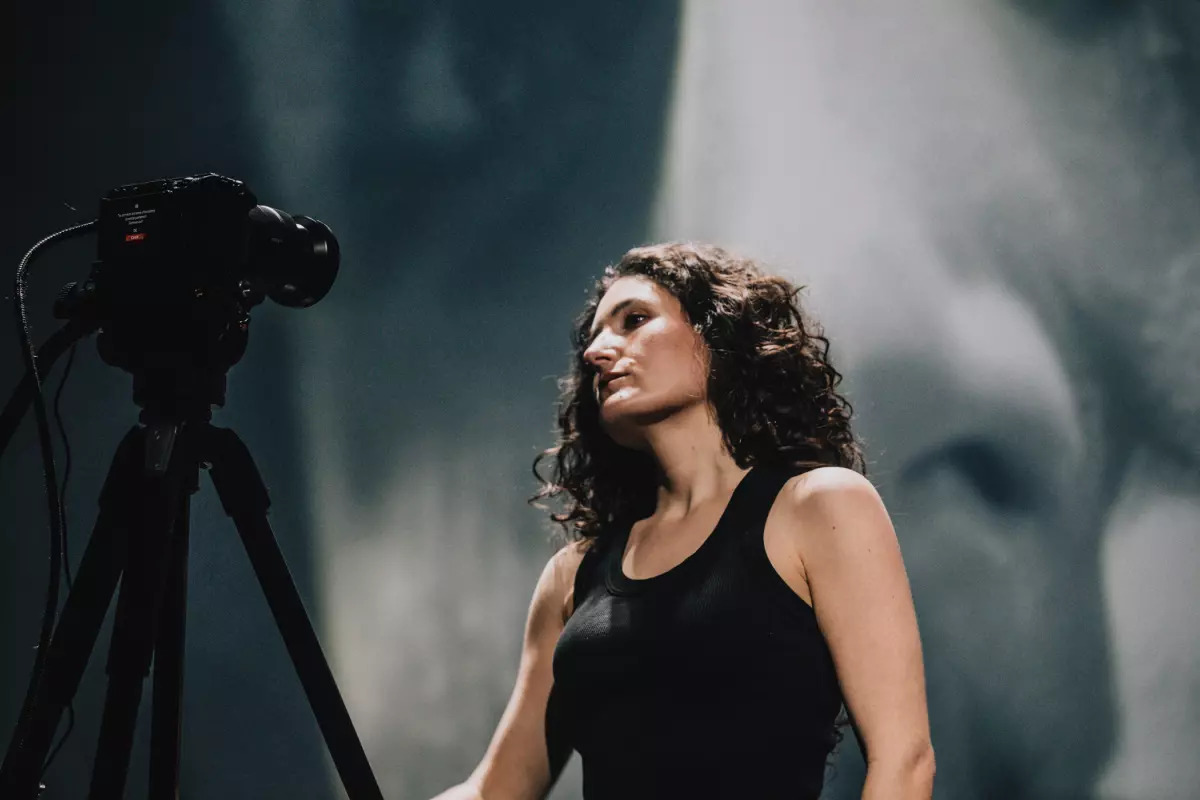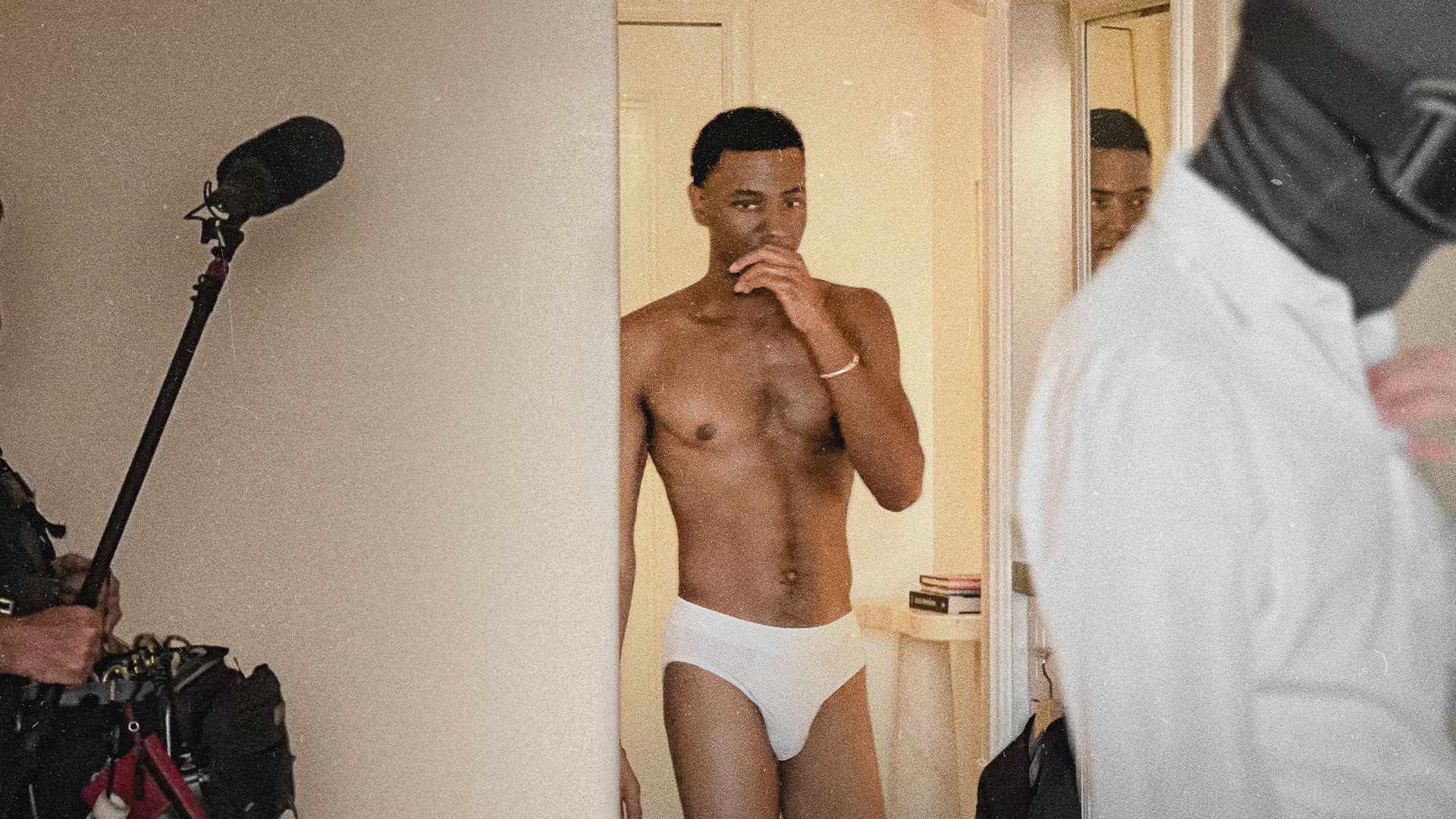From Jacqueline Novak to Jerrod Carmichael, millennial comedians are finding inspiration in their literary counterparts. Who gets the last laugh?
“All we have are our stories,” says comedian Jacqueline Novak during her 2024 Netflix special Get On Your Knees. The story she is telling is that of her youth, told through the prism of oral sex. After opening with a gag in which she compares walking to the microphone to a woman moving down a man’s body towards his penis, the next 95 minutes are a feat of verbal exuberance and astonishing, berserk energy. She describes the warnings older girls gave her about blowjobs, then her underwhelming experiences with ungrateful boyfriends. She conveys her memories which are often sexually graphic and always concerned with language, especially the absurd ways a patriarchal society talks about sex. “It’s always about communicating awareness for me,” she tells the audience midway through describing what it feels like for a woman to have a “mouthful of genitals”.
Novak has a kindred spirit in Sheila, the narrator of Canadian writer Sheila Heti’s 2012 novel How Should a Person Be?, who says: “We live in an age of some really great blow-job artists. Every era has its art form… I just do what I can not to gag too much.” If there is another artform to ascribe to this era, then perhaps it would be autofiction, a genre which became popular in the 2010s with English-language novels by writers such as Heti, Karl Ove Knausgaard and Ben Lerner. Above all, their experiences are the subject of their writing that blurs the boundaries of fiction and dramatises its own composition. It has since endured in works such as Ocean Vuong’s On Earth We’re Briefly Gorgeous (2019), Elizabeth McCracken’s The Hero of This Book (2023), Sigrid Nunez’s The Vulnerables (2024) and Garth Greenwell’s Small Rain (2024). However (with notable exceptions such as Heti’s Alphabetical Diaries, published earlier this year) the early examples of the genre were arguably the most formally-inventive.

The influence of these writers can increasingly be seen today in the work of a spate of American comics of the millennial generation. As the stand-up show graduates from a live, in-the-room performance to the more artificial realm of pre-recorded ‘specials’, new opportunities for invention and self-reflexive dramatization arise. Comedians such as Novak, Kate Berlant and Jerrod Carmichael, who are all in their late-thirties or early-forties and of the prime age to have absorbed the cultural impact of autofiction in the past decade, all show the influence of the literary genre. While comics have been talking about themselves in their routines for decades, the pared back aesthetics of this generation’s performances, and the emotional vulnerability that comes with their frankness, gives their work deeper intensity.
Take Novak, for example, who in Get On Your Knees likes to shock her audience with her sexually-explicit yet archly self-aware material from the outset. It’s a familiar literary device, employed too by Heti, whereby instability and tension are built by leaving it unclear to the audience just how much of what they are revealing is real and how much is invented. When Novak plays with the fundamental elements of stand-up, not even the microphone is safe from the influence of her worldview. She reflects upon the formative hours she spent as a student browsing volumes of Sharon Olds’s poetry in bookstores. Indeed, Novak’s delivery shares some of the confessional urgency of Olds’ work. In collections such as One Secret Thing (2008), the poet deploys the lyric ‘I’ and writes about sex, her family, abuse and death in a tumbling free-verse form which creates the illusion of spontaneity to achieve its startling effects – much like Novak’s routine. Elsewhere in her performance, Novak comments that, as a self-consciously sexualised undergraduate, she was “like a Philip Roth character”.
In fact, when Philip Roth was asked in an interview with the New York Times if the comic energy that pulsed through his 1969 novel Portnoy’s Complaint was influenced by Lenny Bruce and other Jewish stand-up comedians of the day, Roth said: ‘Not really. I was more strongly influenced by a sit-down comic named Franz Kafka.’ The latter’s influence couldn’t be missed in Kate Berlant’s stand-up show Kate, which she performed at London’s Soho Theatre last year. The performance began before the audience had arrived as the comedian sat in the lobby, dressed in black, with a sign around her neck that read, ‘Ignore Me’. Later, on stage, Berlant reconstructed scenes from her life – sitting on the porch of her childhood home in California, arriving in New York as a young performer, auditioning for roles – while simultaneously deconstructing the show itself. She deliberately messed up certain scenes, then restarted them in a way not dissimilar to the struck-through passages in Lerner’s novel 10:04 (2014). With a shrug and sidelong glance, Berlant told the audience that she didn’t care if her show worked or not.


For all that Berlant’s stage persona feigns indifference to the success or failure of Kate, it was fine-tuned under the direction of fellow comedian Bo Burnham whose own special Inside (2021) thrived on self-reflexivity and left the audience unsure whether what they were watching was the product of a lockdown-induced personal crisis, an extended joke or both. The turn inward and increased emphasis on autobiography in comedy in the immediate aftermath of the pandemic could be a response to the period when many people’s lives felt smaller and more confined, leaving them with new opportunity for prolonged introspection.
Burnham has played a significant role too in the emergence of Jerrod Carmichael whose ground-breaking 2022 special Rothaniel, in which Carmichael came out as gay, was directed by Burnham. In the one hour show, Carmichael sits in the middle of an unadorned stage, wearing Birkenstock clogs, ostensibly working through personal matters in public and even asking the audience for their input. It feels sincere, the antithesis of the heckler dynamics of comedy clubs of old, and the effect is incredibly intimate, his delivery conversational, giving the audience the impression that he is talking directly to them.

It is consoling to see artists being funny about the kind of experiences that many will recognise. Not everyone has, as Carmichael does, parents who refuse to accept his sexuality, but everyone has a family which involves complex feelings and fraught relationships. In his eight-episode TV series Reality Show, Carmichael repeatedly intercuts scenes from his live performances with documentary footage about his relationship with his boyfriend Mike, sex addiction, therapy and arguments with his parents. In doing so, he explicitly blends his public persona with his private life, while leaving the boundaries between the two ever-more unclear. By the end, his viewers may have the impression that they know him and his family personally, and yet ultimately find themselves entangled in a multi-layered web of intimacy and artifice, proximity and distance. Just as writers like Knausgaard and Heti offer up the day-to-day minutiae of their lives in painstaking detail while drawing into question their own reliability as narrator, so do these comedians highlight the blind spots and power dynamics inherent in the relationship between performer, audience and the stage. As one of Roth’s alter-egos says in his 1990 novel Deception: ‘I write fiction and I’m told it’s autobiography; I write autobiography and I’m told it’s fiction.’
Max Liu is a freelance journalist who contributes regularly to the i, the Financial Times and BBC Radio 4
